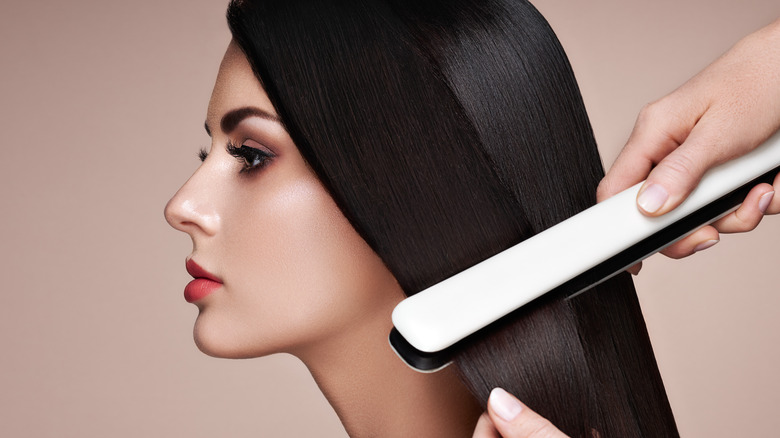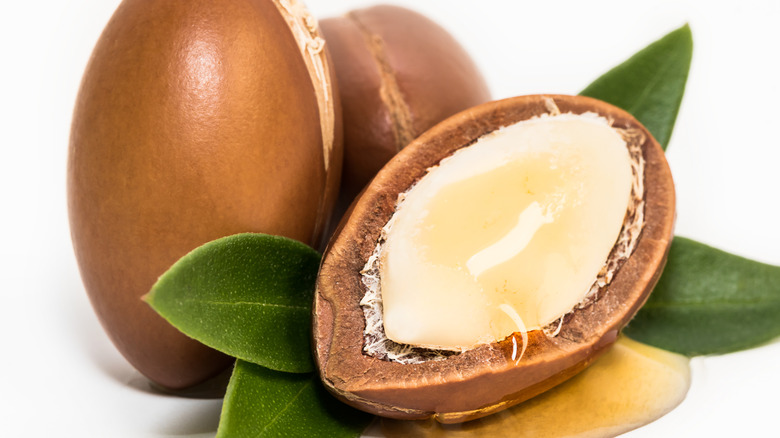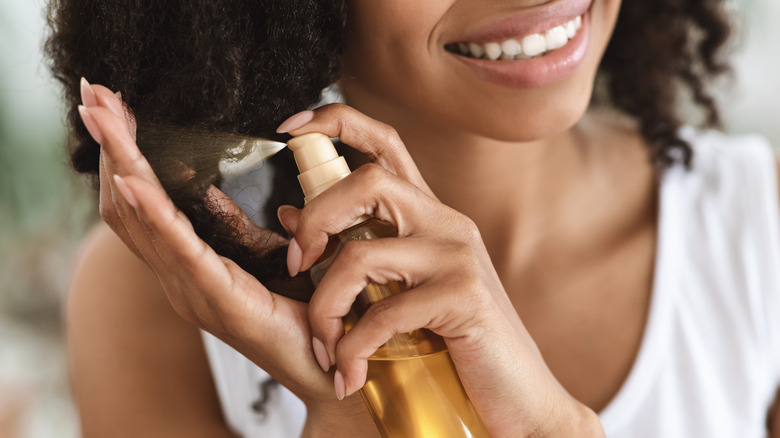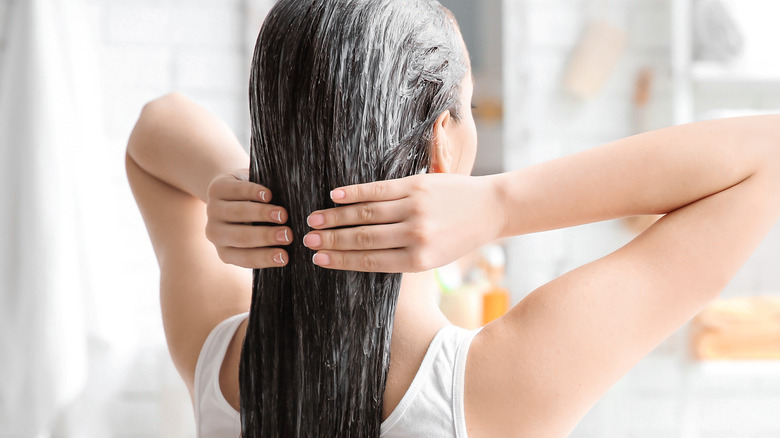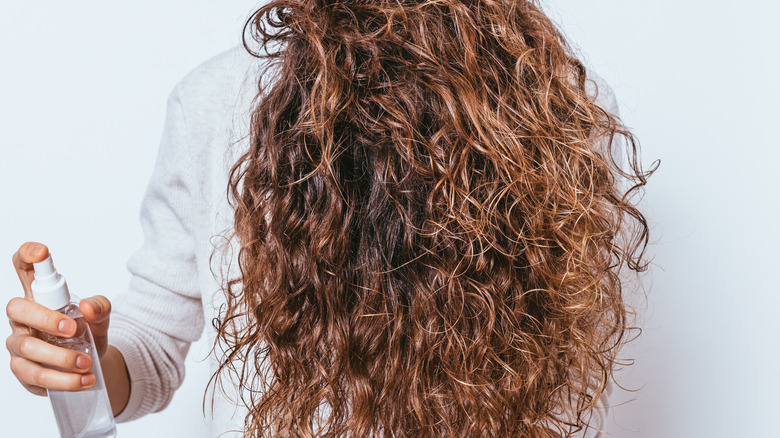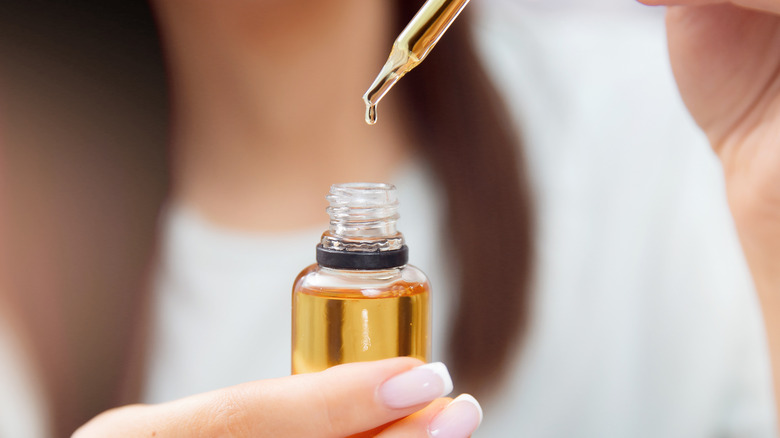Why You Should Use Argan Oil On Your Hair Before Heat Styling
It's the ever-ongoing dilemma: how to use a curling wand or straightener to make your hair look styled and beautiful without using so much heat that it damages your hair.
Like your skin, good hair health comes from within, and when your hair becomes problematic, it can signal a health issue. Hair loss can be a sign of thyroid issues or iron deficiency anemia (via the Cleveland Clinic). While there are foods that can boost hair health, you can also try taking supplements to help your hair grow.
Once you've ensured that your hair is being nourished from the inside, it's time to turn those efforts toward protecting your hair from the outside. Harsh environments and changing weather can definitely dampen the looks of your locks, but nothing quite damages hair like the repeated use of heat, as noted by Dyson. Even using a simple flat iron daily can affect your tresses.
However, argan oil may be just what the doctor ordered to preserve hair health despite heat styling.
What is argan oil?
Argan oil is native to Morocco, and the story of how it's made is pretty fascinating. The oil is extracted from the fruit of the argan tree (via Reuters). Inside the fruit are kernels that look like almonds, which need to be separated. Though nearly everything is done by machinery today, extricating the inner kernel (which looks like small seeds) from the hard-shelled outer kernel must be done by hand. Cooperatives of women use stones to manually pound the hard shells open. Once the seed-resembling inner kernels are pulled out, a machine takes over to press the oil from them. One liter of argan oil ultimately takes about three days of work.
In Morocco, argan oil is known as liquid gold, and is used for nutritional, medicinal, and beauty benefits (via Vogue). Asma El Mernissi, who founded a luxury beauty spa in Morroco, tells the magazine, "This oil is so rich in antioxidants and anti-inflammatory properties, including vitamins A, C, and E, fatty acids, and omega 6." On the beauty side, argan oil can be used for the skin, nails, and as a massage oil; however, one of the biggest cosmetic uses is for the hair.
How argan oil works to counter heat effects on hair
We've all smelled that pungent scent of our hair burning under the iron or curling wand. Unfortunately, that's a sign you're damaging hair follicles. It's the one thing we absolutely need to avoid when we style with heat. That's where argan oil comes in.
One of the biggest benefits of using argan oil before heat styling comes down to science. When you heat your hair, it's the intensely high temperature that causes damage and burns your hair, so one trick is to protect your hair with argan oil before you even break out the curling wand.
Argan oil has a high smoke point (also known as a burning point), coming in at 420 degrees Fahrenheit (via MindBodyGreen). If you use argan oil before your heat style, you just have to keep your heating tool at less than 420 degrees to ensure your hair never reaches this point.
Argan oil's fatty acids help nourish hair
Like our skin, our hair needs a consistent supply of moisture for it to look and feel vibrant. The trick to any beauty routine is often not a trick at all, but essentially a commitment to regularly use products that help give skin and hair the nutrients they need. Start with a regular conditioning routine every time you wash your hair to keep it shiny and healthy (via Self). There can be disastrous results when you stop using conditioner. Next, consider weekly deep conditioning, and then add argan oil to your pre-style heat routine.
Argan oil has so many moisturizing ingredients to help renourish stressed hair strands damaged from heat. First off, it contains a great amount of oleic and linoleic fatty acids. These fatty acids work to nourish and protect dry hair (via Healthline). Argan oil also contains vitamin E, which is both an antioxidant and an anti-inflammatory agent, and necessary for healthy hair.
Use argan oil to prevent hair breakage from heat
Regularly applying heat to your hair is one of the most common causes of hair breakage in the form of split ends (via L'Oréal). Split ends cause a direct cut or splice in the hair strand, which also fractures chemical bonds. Those bonds normally work to fortify hair, but once broken, strands become frail and literally break off. On top of that, the only way to correct split ends is to cut them off and give the hair follicles a chance to strengthen.
For this reason, preventing split ends from ever happening is the best thing you can do for healthy-looking hair. Besides trying to keep the temperature down when you're using heat on your hair and avoiding the use of heat on a daily basis, applying argan oil can help set up the hair follicles to stay moisturized, per Healthline. Follicles that are well-nourished are not only more flexible and adaptable, but they respond better to harsh factors like heat, weather, and environmental agents.
Argan oil as a hair mask protects from ongoing heat
Finally, what you do after applying heat can be just as important as what you do beforehand. If you regularly use a curling iron, waving wand, or straightener, or even if you simply blow out your hair a few times a week, using an argan hair mask can do wonders for those delicate locks.
Celebrity hairstylist Andrew Fitzsimons tells Byrdie that using argan oil as a hair mask to moisten and hydrate has multiple benefits. "An argan oil hair mask is amazing particularly if you have damaged hair. The vitamin E in the oil helps smooth frayed hair shafts and seal split ends while the omega fatty acids work to strengthen your hair," Fitzsimons explains. "Leave it on for 15 to 30 minutes to reap the oil's full benefits."
There are countless products with argan oil on the beauty shelves. To find the best types, look for a deep, rich, golden hue and make sure that argan oil is listed as one of the first ingredients on the product label. Otherwise, you may be getting a product with a low dosage of the oil, which isn't helpful.
